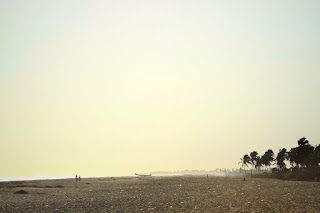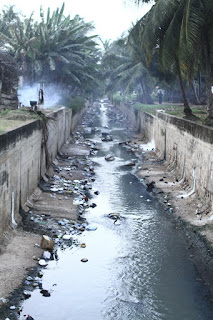
Our accommodations were modest: a simple hut with a bed, mosquito net, chair, desk, lone bare lightbulb and the sandy beach for the floor. My hosts packed a picnic to last two days, and we (they) borrowed the hotel barbeque to cook dinner on the beach. It was peaceful, relaxing and simple enough to allow us to shield ourselves from the guilt of seeing small children working while we lounged. That is, until we saw the younger girl sucking the juice from the discarded rind while the older one deftly carved the pineapples and scolded her sister. Like many places in the developing world, the discrepancies between tourists and the local communities that partially rely on them are striking.

On the river side of the hotel, we breakfasted feet away from the calmly lapping water. On the ocean side, the sand stretched across vast expanses, reaching up to meet the sky and then sloping down to a sharp crest separating beach from ocean. It was so empty. At night, I felt utterly isolated sitting under the brilliant stars with creamy moonlit sand extending as far as I could see. After living in New York, you forget how empty parts of the world can be.

The moment I arrived, I was ready to dive in the ocean. I walked across the never-ending beach with barely contained excitement, until I peered over the sandy crest that held me above the water:

Trash. And more trash. Trash upon trash. The strip of plastic bags testing my desire to swim is the only thing to mar the stunning landscape. (Needless to say, the maze of plastic waste didn’t hold me back; it’s undeniable, however, that black plastic bags are not as pleasant to brush against in the water as seaweed.) A local teenager who appointed himself my tour guide told me that it was all from Accra, but I doubt the local community is exactly employing perfect waste management systems... I asked him why no one cleaned it, and he told me it was just because it was a weekend. I looked skeptically at the dense layer of plastic and pointed out that it looked like more than a weekend’s worth of trash. “Oh, well this part maybe the ocean will take it away.”

How long do you wait to see if the ocean is going to take away your trash before you start doing it yourself? We were charged a slight toll on our way to Ada, which we were assured would go towards cleaning the beach, but I have a hard time believing that my measly 3 cedis will really make a substantial dent in the fields of plastic. Of course, the trash problem isn’t limited to Ada: Accra’s reeking open gutters (into which you’re likely to see at least one man peeing every day—staring at the obruni the whole while) are also lined with drowning plastic wrappers and discarded juice boxes. I remember Gulu, Uganda, where there were heaps of garbage along the road, but where my host family barely bought anything with packaging that couldn’t be reused for years.

In Rwanda, plastic bags are outlawed. You actually get fined if you’re caught bringing a plastic bag into the country. It may sound like a small thing, but this is an incredible feat in the Ghanaian context. Here there is an obsession with plastic bags. You can’t buy anything without receiving at least one plastic bag, or “rubber”, and if (God forbid) the little shop should run out of the appropriate size of bag, the cashier will look at you apologetically and offer a bigger one to compensate. Often, your single purchase will be wrapped in not one but two bags, or each individual item will merit its own separate bag (all of which will go inside another, larger bag). The other main culprit is the ubiquitous water sachet, a cheap, popular alternative to water bottles. They are, in fact, quite handy, and my new housemate and I bought three huge packages of them to forestall our running water crisis: city water has been cut off to my neighborhood, and purchasing water to fill our tanks is a very short-term solution. Are they more wasteful than plastic water bottles? I don’t know, but their wrappers are everywhere, and because people drink them on the go, it’s considered perfectly acceptable to simply throw them on the ground or in the gutter when you’ve finished.

So how do you create incentives to eliminate the plastic bags? Surely the production of these things doesn’t turn such a huge profit that there could be a “plastic bag lobby,” right? And the Rwandan example demonstrates that the bags are far from necessary, despite their overuse. I suppose the American example is a more appropriate point of comparison, and even there it will be a long time before the last plastic bag is handed over a counter. But how can Ghana be encouraged to at least start the process? When will people look at the beautiful beaches of Ada and say not, “What a shame” or “It’s not fair that Accra’s trash comes here,” but rather, “We need to change our own lives and the way things run on a bigger scale”? I’ve heard of some projects that recycle bottles, but I’d be interested to learn of other programs to start dealing with this problem.
In the meantime, I enjoyed a small early birthday party on Saturday with my new housemate and Saleh, who made delicious Sudanese tea and bought me a lovely birthday cake at what is apparently the best bakery in Accra. I’m a lucky girl.




